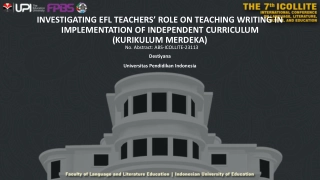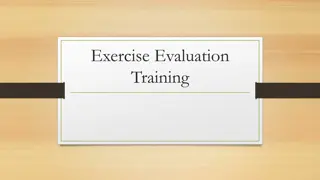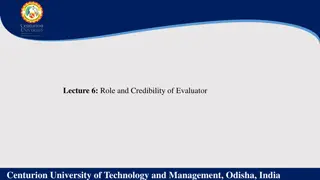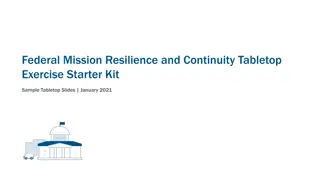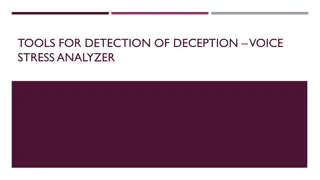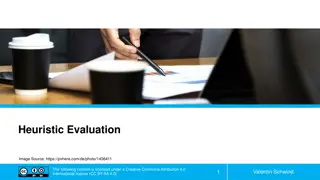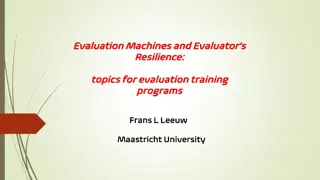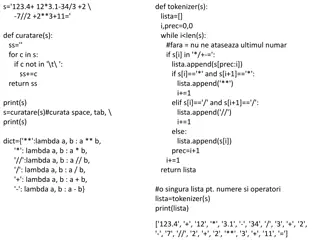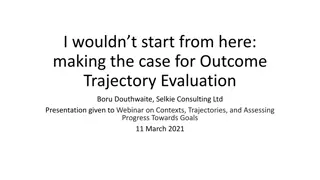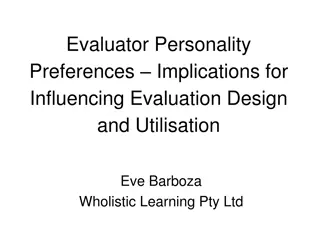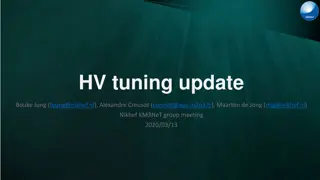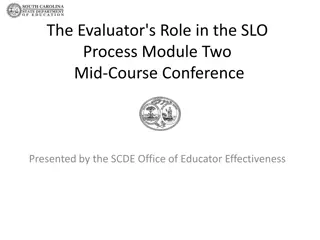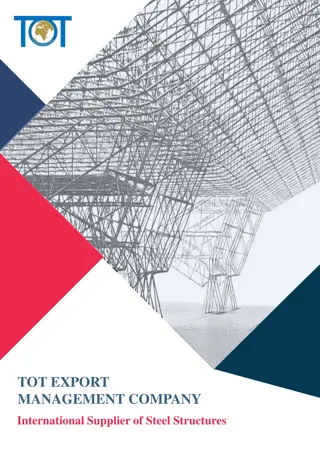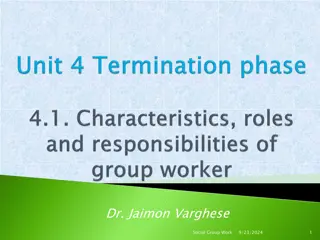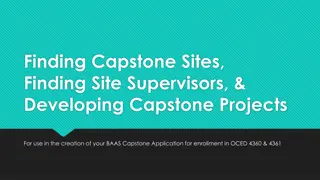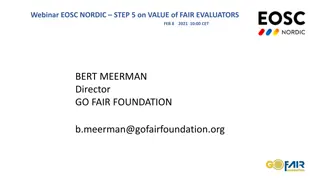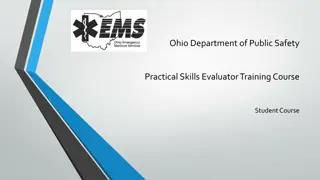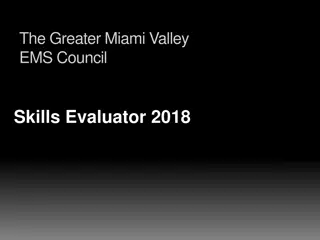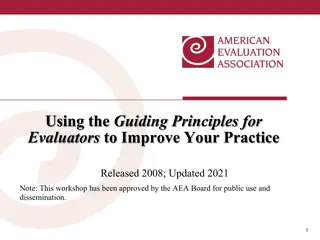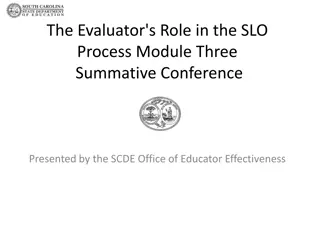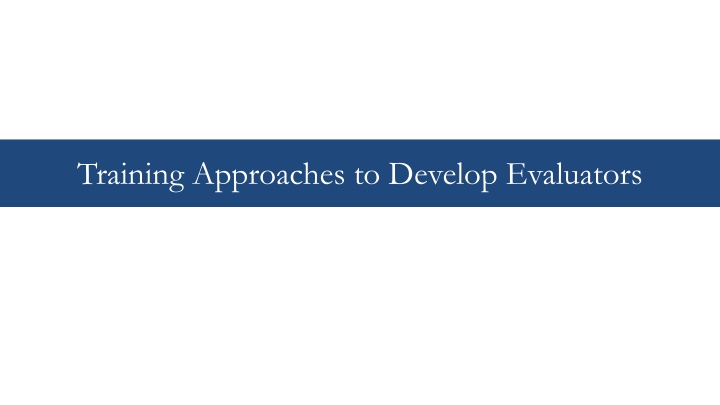
Developing Evaluator Skills and Roles for Effective Assessment
Enhance your understanding of evaluator roles and responsibilities, skills required for HIV-RT personnel competency assessment, and best practices in conducting assessments. Explore technical and quality management expertise needed for successful evaluation.
Download Presentation

Please find below an Image/Link to download the presentation.
The content on the website is provided AS IS for your information and personal use only. It may not be sold, licensed, or shared on other websites without obtaining consent from the author. If you encounter any issues during the download, it is possible that the publisher has removed the file from their server.
You are allowed to download the files provided on this website for personal or commercial use, subject to the condition that they are used lawfully. All files are the property of their respective owners.
The content on the website is provided AS IS for your information and personal use only. It may not be sold, licensed, or shared on other websites without obtaining consent from the author.
E N D
Presentation Transcript
Learning Objectives At the end of this session, participants will be able to: Describe the evaluator roles and responsibilities Describe the skills and abilities required to be an evaluator of HIV-RT personnel competency Distinguish between acceptable and unacceptable practices when conducting a personnel competency assessment. Understand the training approach for personnel evaluators.
Evaluator Role and Responsibilities Coordinate personnel competency assessments and corrective actions Conduct competency assessments Provide feedback to Testers and Supervisors Mentor Testers Train other Evaluators (Master Evaluators) Enter and Analyze Data
Evaluator Role and Responsibilities Exercise Evaluator Roles and Responsibilities Associated Evaluator Attributes Coordinate personnel competency assessments and corrective actions Good conflict management Good time- management Good organization Self-reliant Good time- management Conduct competency assessments observant Detail oriented decisive Provide feedback to Testers and Supervisors Effective communication Good conflict management Mentor Testers Good listener patience Train other Evaluators (Master Evaluators) instructional analytical patience Enter and Analyze Data Detail oriented
Attention to detail Important Skills for Evaluators Communicate effectively Trained Technical/ Quality management expertise Diplomatic
Technical and Quality Management Expertise Evaluators must: Have at least a general knowledge of safety, infection control, and key components of quality assurance Possess technical knowledge related to the current national HIV-RT algorithm Understand quality assurance cycle concepts, personnel competency assessment tools, database management, and corrective action (remediation) Demonstrate a track record of appropriate knowledge and skills related to a healthcare setting
Diplomacy and Professionalism Evaluators must be diplomatic and professional: Respectful of others Ethical (i.e., fair, truthful, sincere & honest) Decisive (i.e., timely decision-making using logic, reasoning & critical analysis) Self-reliant (i.e. function independently while interacting effectively with others) Maintain confidentiality Objective (unbiased, impartial) Ensure cultural sensitivity in all environments Communication: Encourage or discourage; sooth & heal or crush & destroy Address issues not personalities Demonstrate investment in ensuring maintained personnel competencies by offering constructive feedback and remediation planning
Evaluators Skills & Abilities Evaluators must: Interpret and apply the appropriate direct observation checklist to different personnel competency assessment situations Be able to collect relevant, reliable, factual evidence from observing personnel and surroundings Observe effectively Be very detail focused Exercise sound judgment & analytical skills Demonstrate investment in ensuring maintained personnel competencies by offering constructive feedback and remediation planning
Areas of Application for Skills and Abilities Coordinate personnel competency assessments at testing sites/points Conduct a personnel competency assessment fairly and without fear or favor Effectively communicate - oral & written to ensure achievement of personnel competency assessment objectives Evaluating personnel competency assessment observations and interactions to arrive at logical conclusions Avoiding distractions and managing time Control conflict with others and managing stressful situations Withstanding pressure to change views to ones not based on objective evidence Effectively assess and solve problems
The many faces of Communication: How we send and how we receive messages What we say and others hear What others say and we hear How we communicate with : Ourselves Our Family Our Colleagues Our mentors and teachers Strangers may differ considerably
Effective Communication What is said may not be what is heard Choose words carefully Observe how they are received What is heard may not be understood Engage in discussion to ensure understanding What is understood may not be accepted The tester may be defensive during the competency assessment
80% of Communication is Non-Verbal Body Language Posture Eye contact Arm position Facial Expression Eyes Mouth Voice intonation Overall attentiveness Communication is give and take what non verbal body language are YOU sending?
Evaluators Practice Reflection to Continuously Improve Description What happened Feelings Action Plan What were you thinking and feeling If it arose again what would you do Reflective Practice Evaluation What was good and bad about the experience Conclusion What else could you have done Analysis What sense can you make of the experience Continuously learning from experience ..
Evaluator Dos & Donts Do: Give compliments when deserved Encourage staff to achieve competency objectives Be fair to all Use respectful and tactful language to give feedback Remember that quality is generally about systems/protocols/habits and not personalities Remember that personnel competency assessments are to ensure improved reliability and better patient care
Evaluator Dos & Donts Don t: Focus on insignificant issues Attempt to catch lab staff out Intimidate and talk down to staff Try to find only what s wrong and ignore what s right Stimulate conflict Be prescriptive and dogmatic (i.e., only your view counts) Give unclear feedback Base observations on information that has not been validated
Cascade Training Approach ToT Stepdown (Training of Trainers) Evaluators Master Evaluator/Trainer Evaluators RTCQI POC- Facilitator (ILB) Country CDC/IPs/MoH Evaluators Master Evaluator/Trainer Evaluators 17
TOT Agenda Overview Day 1 Pre-training written assessment In-depth didactic and hands-on training about the personnel competency assessment tools and the role/expectations of an evaluator Days 2 & 3 Practical examples and group work related to evaluator role Field practical assessment sessions to cultivate and ensure successful observation and assessment practices during actual HIV-RT personnel competency assessment Facilitator feedback and open discussions
Practical Examination for Evaluators During TOT Facilitator direct observation of HIV-RT Peer-to-peer observation Participant 1 (prospective Evaluator) Participant 2 (prospective Evaluator) direct observation of HIV-RT Tester 1
Practical Examination for Evaluators During TOT Facilitator direct observation of HIV-RT Peer-to-peer observation Participant 1 (prospective Evaluator) Participant 2 (prospective Evaluator) direct observation of HIV-RT Tester 2
Practical Exam Feedback Form (Rate Evaluator s Performance)
TOT Agenda Day 4 Post-training written assessment Preparation and group report backs on field practical sessions Facilitator feedback Open discussion Written examination administration Implementation strategy for roll-out Workshop evaluation Closing ceremony and certification
Evaluation Criteria for Participants SCORING CRITERIA LEVEL 1 <70% LEVEL 2 70-79% LEVEL 3 80-89% LEVEL 4 90% Attendance Pre-Training Written Assessment Training Content Comprehension Competency Assessment Skills - Practical Computer Skills / Data Management Comprehension Post-Training Written Assessment 23
Competency Levels for Participants Level 4 Potential trainer and evaluator of personnel competency. Ready to facilitate and conduct competency assessment using both direct observation checklist and peer-to-peer observation form Level 3 Needs more development as a facilitator and/or an evaluator. Should work under the guidance of more experienced evaluators. OVERALL COMPETENCY LEVELS Level 2 Does not have acceptable facilitation and/or evaluation skills, but understands the training package well and has inter-personnel skills. May be able to use the checklist to identify deficiencies in personnel competency. Level 1 Cannot facilitate or conduct competency assessment. May be able to assist with logistic support or data management for the QAC. May be able to serve as proctor for written examination. Levels 1 4 24
Summary What are the skills and abilities required to be an evaluator? What are some acceptable and unacceptable practices when conducting a personnel competency assessment? What can evaluators do to strive to continually improve?

